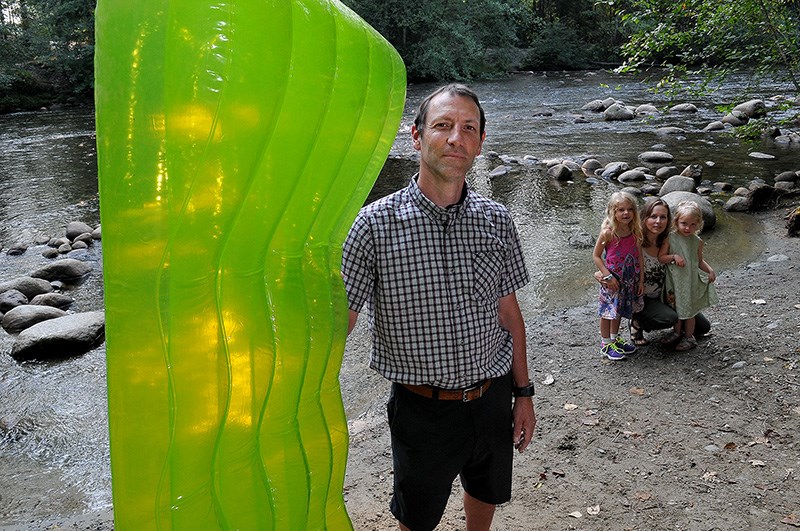There’s nothing Christopher Moreno and his wife Natalie like to do better to beat the heat than floating down the Coquitlam River on an inflatable raft with their daughters, Saige and Amber.
But their cooling cruise during the recent hot spell was soured by the amount of trash and litter they spied along the riverbanks and in the water itself.
So a few days later the Morenos went out again — this time without their kids and equipped with garbage bags — to do something about it.
As they floated from David Avenue to Lions Park in Port Coquitlam they collected more than five pounds of costume jewelry, assorted flip-flops and sandals, beer cans and water bottles. What they couldn’t fit into their bag were the discarded lawn chairs and even a shopping cart.
“It becomes such a daunting task when you see how much trash there is all along the river,” said Natalie.
In fact, the couple had to cut their clean-up mission short at Lions Park because they ran out of bags.
Verne Kucy, the environmental projects manager for the city of Coquitlam, said while the city doesn’t have a staff person dedicated to patrolling the riverbanks, it does work closely with community organizations and vigilant citizens to respond to calls about excessive trash heaps or large discarded items. Parks staff also check the river and its shores during their routine servicing of parks or trails.
“There’s quite a few eyes on the river,” Kucy said.
One of those sets of eyes belongs to Jeff Rudd, a volunteer with Coquitlam RiverWatch, a volunteer initiative that was started in 1997 to protect the Coquitlam River watershed. Members of the group patrol the watershed monthly to observe the level of human activity, litter and pollutants, as well as water quality and wildlife. That information is then compiled to create an ongoing profile of the river’s health.
“I find litter and garbage all along the river, but it is usually concentrated at the beaches,” Rudd said of his regular patrols along the river from David Avenue to the Patricia footbridge.
He said he’s found everything from cigarette butts to deflated inner tubes to a patio table. In 2016, he collected 124 flip-flops, all of them singles except for one pair.
“It demonstrates very clearly the heavy use the river receives,” Rudd said.
And that use is growing as the population of the Tri-Cities increases, especially when the weather gets warm.
“People picnic on the beach, tube down the river, swim, drink,” Rudd said.
Kucy said the city’s efforts to keep the rivershed clean have been aided by its adopt-a-trail program that allows individuals, organizations, schools, businesses or even families to take stewardship of a section of trail to keep it clear of litter, graffiti and hazards. About 10 kilometres of trails along the river have been adopted.
“I think people are becoming more conscientious,” Kucy said.
The Morenos said they were reminded of the importance of keeping the river clean when they also saw an owl and a deer as they floated along.
“You realize how much lives along the river,” Christopher said. “You want to make sure it’s safe for the wildlife that lives here.”
That wildlife includes up to 24 species of fish, mammals, birds, amphibians like the red-legged frog, reptiles and insects as well as native vegetation, Rudd said.
“Human use of the river affects all these creatures.”
Even seemingly innocuous acts like taking a shortcut through some bushes or letting the dog run loose to cool off in the water can stress the habitat, Rudd said.
It’s all about taking personal responsibility, Christopher Moreno said.
“If a few more people took care, it would be a really clean river.”
Here’s how you can help keep the Coquitlam River clean:
• If you carry something to the river, you should take it with you when you leave.
• No fires, and no smoking.
• Walkers, dogs and cyclists should stay on authorized trails.
• Bag your dog’s poo and dispose of it responsibly — don’t just toss it into the bushes.
• If you see litter, carry it out.
• If you see someone smoking or having a fire, speak to them or call the Fire Department.
To find out more about the Adopt-a-trial program, go to http://www.coquitlam.ca/parks-recreation-and-culture/parks-and-trails/park-programs/Adopt_A_Trail_Program.aspx



